Books on consciousness
A list of books relating to the hard problem of consciousness. Regularly updated cos I keep finding new stuff all the time.
A list of books relating to the hard problem of consciousness. Regularly updated cos I keep finding new stuff all the time.
2019
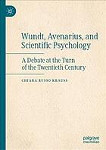 Chiara Russo Krauss
Chiara Russo Krauss
Wundt, Avenarius, and Scientific Psychology: A Debate at the Turn of the Twentieth Century
(Palgrave Macmillan 2019)
This book reconstructs the rise and fall of Wilhelm Wundt’s fortunes, focusing for the first time on the role of Richard Avenarius as catalyst for the so-called “positivist repudiation of Wundt.” Krauss specifically looks at the progressive disavowal of Wundtian ideas in the world of scientific psychology, and especially by his former pupils. See Springer | Amazon | Google | New Books Network
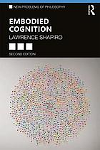 Lawrence Shapiro
Lawrence Shapiro
Embodied Cognition
(Routledge 2019, 2nd edition)
Sets out the central themes and debates surrounding embodied cognition, explaining and assessing the work of key figures in the field such as Barsalou, Casasanto, Clark, Noë and Spivey. Substantially revised and more user-friendly than the original 2010 edition, this is the most up-to-date book length treatment of the field presently available. See Routledge | Amazon | Google
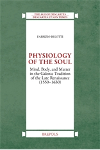 Fabrizio Bigotti
Fabrizio Bigotti
Physiology of the Soul: Mind, Body and Matter in the Galenic Tradition of Late Renaissance (1550-1630)
(Brepols 2019)
Despite the common opinion that Galen’s authority was superseded by Vesalius and his followers, a close look at his influence on the early moderns reveals a different picture. Galenists embraced the new anatomical discoveries and transformed the traditional rationale. Through the lens of mental disease, a new concept of the human animal emerges, foreshadowing early modern ideas on subjectivity and the self. See Brepols | Google
 Richard Swinburne
Richard Swinburne
Are We Bodies or Souls?
(Oxford 2019)
Swinburne defends the soul with new philosophical arguments supported by neuroscience. Sensations, thoughts, and intentions are conscious events in our souls that cause events in our brains. While scientists might discover laws that link conscious events and brain events, each person’s soul is an individual thing and this is what ultimately makes us who we are. See Oxford | Amazon | Google
 J. Knowles & T. Raleigh (eds.)
J. Knowles & T. Raleigh (eds.)
Acquaintance: New Essays
(Oxford 2019)
Russell famously distinguished between ‘knowledge by acquaintance’ and ‘knowledge by description.’ For much of the latter half of the twentieth century, the notion of acquaintance was viewed with suspicion, but in the past decade or two the concept has undergone a striking revival. As this volume testifies, acquaintance is, it seems, respectable again. See Oxford | Amazon | Google
 Bernardo Kastrup
Bernardo Kastrup
The Idea of the World: A Multi-Disciplinary Argument for the Mental Nature of Reality
(John Hunt 2019)
This book compiles an overarching case for idealism, the notion that reality is essentially mental, from ten original articles the author has previously published. Kastrup explains his dissatisfaction with mainstream physicalism and advances a compelling formulation of idealism that elegantly makes sense of and reconciles classical and quantum worlds. See John Hunt | Amazon | Google
 Catherine de Lange (ed.)
Catherine de Lange (ed.)
10 Voyages Through the Human Mind: Christmas Lectures from the Royal Institution
(Michael O’Mara 2019)
Undoubtedly the most complex material in the universe, the human brain makes us who we are, but how it works has long been a mystery. Through this series of Christmas Lectures from the Royal Institution, spanning over a hundred years, experts in the fields of psychology, neurology and biology examine our most important organ, revealing a hidden and complex world. See Michael O’Mara | Amazon | Google
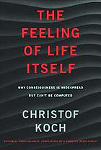 Christof Koch
Christof Koch
The Feeling of Life Itself: Why Consciousness is Widespread but Can’t Be Computed
(MIT 2019)
To grasp how the brain can give rise to subjective experience, we need a quantitative theory that starts with experience and proceeds to the brain. In this book, Koch outlines such a theory, based on integrated information, and ponders its implications. Programmable computers will not have consciousness because consciousness is not a special type of computation but the feeling of being alive. See MIT | Amazon | Google
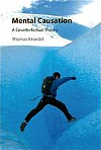 Thomas Kroedel
Thomas Kroedel
Mental Causation: A Counterfactual Theory
(Cambridge 2019)
Our minds have physical effects. This happens, for instance, when we move our bodies when we act. How is this possible? Kroedel defends an account of mental causation in terms of difference-making: if our minds had been different, the physical world would have been different; therefore, the mind causes events in the physical world. See Cambridge | Amazon | Google
 Sharon Dirckx
Sharon Dirckx
Am I Just My Brain?
(The Good Book Company 2019)
What is the relation between our brains and our minds? Are we more than machines? Is free-will an illusion? Do we have a soul? Brain-imaging scientist Sharon Dirckx lays out the current understanding of who we are from biologists, philosophers, theologians and psychologists, and suggests answers to the fundamental questions of our existence. See Good Book Company | Amazon | Google
 Casey O’Callaghan
Casey O’Callaghan
A Multisensory Philosophy of Perception
(Oxford 2019)
Most of the time, we perceive using multiple senses and use our senses together to navigate the world. In spite of this, scientists and philosophers alike have focused merely on one sense at a time. Nearly every theory of perception is unisensory. In this book, O’Callaghan offers instead a revisionist multisensory philosophy of perception. See Oxford | Amazon | Google
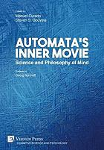 M. Curado & S. S. Gouveia (eds.)
M. Curado & S. S. Gouveia (eds.)
Automata’s Inner Movie: Science and Philosophy of Mind
(Vernon Press 2019)
The philosophy of mind often intersects with biology and neuroscience. This volume draws together thinkers from both fields and allows readers to understand the general field of theoretical neurophilosophy. Science’s dependence on theoretical frameworks mirrors philosophy’s dependence on empirical data – this volume unites the two missions. See Vernon Press | Amazon | Google
 Peter Carruthers
Peter Carruthers
Human and Animal Minds: The Consciousness Questions Laid to Rest
(Oxford 2019)
The continuities between human and animal minds are increasingly well understood. This has led many to make claims about consciousness in animals, which has often been taken to be crucial for their moral standing. Carruthers argues that there is no fact of the matter to be discovered and that the question of animal consciousness is of no scientific or ethical significance. See Oxford | Amazon | Google
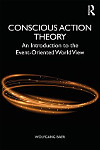 Wolfgang Baer
Wolfgang Baer
Conscious Action Theory: An Introduction to the Event-Oriented World View
(Routledge 2019)
The assumption of “objective reality” is a cornerstone of Western thought. Baer aims to replace it with one that allows the feelings and desires of perceived objects to be included in a physical framework. Recognizing that the observer’s existence underlies all scientific inquiry, he develops an event-oriented physical theory in which the first-person observer is central. See Routledge | Amazon | Google
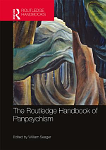 William Seager (ed.)
William Seager (ed.)
The Routledge Handbook of Panpsychism
(Routledge 2019)
This volume of twenty-eight original essays from leading researchers is a comprehensive examination and assessment of panpsychism: the view that consciousness is a fundamental and ubiquitous feature of the world, though in a form remote from human consciousness. Covers the subject, its history and its contemporary development. See Routledge | Amazon | Google
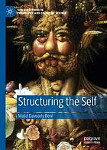 Majid Davoody Beni
Majid Davoody Beni
Structuring the Self
(Palgrave Macmillan 2019)
The substantivalist theory of the self holds that the self is an individual object that bears properties and preserves its identity over time. Neither philosophical argument nor science appears to support this view. Beni offers instead a structural realist account of the self informed by recent work in empirical psychology and computational neuroscience. See Palgrave | Amazon | Google
 Anita Avramides & Matthew Parrott (eds.)
Anita Avramides & Matthew Parrott (eds.)
Knowing Other Minds
(Oxford 2019)
We take it for granted that we can often know the thoughts and feelings of others. But how is this kind of knowledge possible? This volume brings together ten original essays on questions that arise from our everyday social interaction with others and illustrates how questions in philosophy and empirical cognitive science overlap and inform one another. See Oxford | Amazon | Google
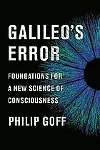 Philip Goff
Philip Goff
Galileo’s Error: Foundations for a New Science of Consciousness
(Penguin Random House 2019)
Based on the work of Arthur Eddington and Bertrand Russell in the 1920s, as well as on an analysis of the philosophical underpinnings of modern science, Goff makes the case for panpsychism, a theory which posits that consciousness is not confined to biological entities but is a fundamental feature of all physical matter—from subatomic particles to the human brain. See Penguin Random House | Amazon | Google
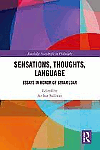 Arthur Sullivan (ed.)
Arthur Sullivan (ed.)
Sensations, Thoughts, Language: Essays in Honor of Brian Loar
(Routledge 2019)
Brian Loar (1939-2014) was an eminent and highly-respected philosopher of mind and language. This volume honors the entirety of his philosophical career, covering his work in the philosophy of language, the philosophy of mind, and consciousness. A fitting tribute to and a timely reflection on Loar’s enduring influence on the philosophy of mind and language. See Routledge | Amazon | Google
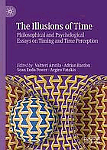 Valtteri Arstila et al. (eds.)
Valtteri Arstila et al. (eds.)
The Illusions of Time: Philosophical and Psychological Essays on Timing and Time Perception
(Palgrave Macmillan 2019)
This anthology gathers eighteen original papers from current leading researchers in the philosophy and cognitive science of temporal illusions Four broad topics are covered: illusions of temporal passage, illusions and duration, illusions of temporal order and simultaneity, and the relationship between temporal illusions and the cognitive representation of time. See Palgrave Macmillan | Amazon | Google
 Jordi Fernández
Jordi Fernández
Memory: A Self-Referential Account
(Oxford 2019)
The goal of this book is to understand a capacity which is central to our mental lives: the capacity for remembering. It offers a unified account of four aspects of memory: its metaphysical nature, its intentional features, its epistemic nature, and its phenomenal features. Fernández suggests that a good account of the first two features will shed light on the latter two. See Oxford | Amazon | Google
 Lars Svendsen
Lars Svendsen
Understanding Animals: Philosophy for Dog and Cat Lovers
(Reaktion Books 2019)
How do animals perceive the world? What is it like to be a cat or a dog? Svendsen investigates how we can begin to understand the lives of other animals from chimpanzees to the octopus, though his main focus is on cats and dogs. He considers animal communication, intelligence, self-awareness, loneliness, grief, and how humans and animals can cohabit successfully. See Reaktion Books | Amazon | Google
 Susan Schneider
Susan Schneider
Artificial You: AI and the Future of Your Mind
(Princeton 2019)
A sober-minded philosophical exploration of what AI can and cannot achieve. Can robots be conscious? Can human beings merge with AI? Is the mind just a program? Schneider proposes ways to test for machine consciousness, asks if consciousness is an unavoidable byproduct of sophisticated intelligence, and considers the overall dangers of creating machine minds. See Princeton | Amazon | Google
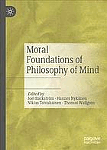 Joel Backström et al. (eds.)
Joel Backström et al. (eds.)
Moral Foundations of Philosophy of Mind
(Springer 2019)
Drawing from a variety of traditions including Wittgenstein, Lacan, analytic philosophy, and phenomenology, these essays explore how unacknowledged moral concerns are integral to debates in the philosophy of mind. We can make sense of the dynamics and significance of these debates only when we understand the moral forces that shape them. See Springer | Amazon | Google
 Martina Reuter & Frans Svensson (eds.)
Martina Reuter & Frans Svensson (eds.)
Mind, Body, and Morality: New Perspectives on Descartes and Spinoza
(Routledge 2019)
Descartes has recently been reinterpreted in important ways, specifically concerning his work on mind and body, objective and formal reality, and morality. This has coincided with a renewed interest in overlooked parts of the Cartesian corpus and the similarities between Descartes and Spinoza. The essays in this volume examine this new turn in Descartes and Spinoza scholarship. See Routledge | Amazon | Google
 Michael S. A. Graziano
Michael S. A. Graziano
Rethinking Consciousness: A Scientific Theory of Subjective Experience
(W. W. Norton 2019)
Scholars have traditionally assumed that something as amorphous and slippery as consciousness must be impossible to understand scientifically. In this book, written for the general reader, Graziano spells out a promising scientific theory of consciousness—the attention-schema theory—that can apply equally to biological brains and artificial machines. See W. W. Norton | Amazon | Google
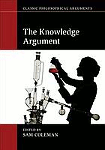 Sam Coleman (ed.)
Sam Coleman (ed.)
The Knowledge Argument
(Cambridge 2019)
Frank Jackson’s knowledge argument revolves around a scientist, Mary, forced to study human colour vision using only black and white resources. The argument was designed to show that the ‘physicalist’ picture of the mind is incomplete. This volume examines this powerful and controversial argument and its relevance for philosophy of mind today. See Cambridge | Amazon | Google
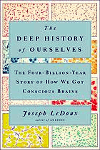 Joseph LeDoux
Joseph LeDoux
The Deep History of Ourselves: The Four-Billion-Year Story of How We Got Conscious Brains
(Penguin Random House 2019)
Renowned neuroscientist Joseph LeDoux digs into the natural history of life on earth to provide a new perspective on the similarities between us and our ancestors in deep time. This page-turning survey of the whole of terrestrial evolution sheds new light on how nervous systems evolved in animals, how the brain developed, and what it means to be human. See Penguin Random House | Amazon | Google
 Donald Hoffman
Donald Hoffman
The Case Against Reality: Why Evolution Hid the Truth from Our Eyes
(W. W. Norton 2019)
Do we perceive the world as it truly is? Cognitive scientist Donald Hoffman says no: while we should take our perceptions seriously, we should not take them literally. How can it be that the world we see is not objective reality? And how can our senses be useful if they do not tell the truth? Hoffman grapples with these questions and more in this eye-opening work. See W. W. Norton | Amazon | Google
 James Kingsland
James Kingsland
Am I Dreaming?: The New Science of Consciousness and How Altered States Reboot the Brain
(Atlantic Books 2019)
When a computer goes wrong, we turn it off and on again. Kingsland reveals how the human brain is similar. By ‘rebooting’ our patterns of thinking, we can gain new perspectives into the world around us. From shamans in Peru to tech workers in Silicon Valley, this is a fascinating tour through lucid dreams, mindfulness, hypnotic trances, virtual reality and drug-induced hallucinations. See Atlantic Books | Amazon | Google
 Declan Smithies
Declan Smithies
The Epistemic Role of Consciousness
(Oxford 2019)
What is the role of consciousness in our mental lives? Smithies argues that consciousness is essential to explaining how we can acquire knowledge and justified belief about the world. On this view, unconscious beings cannot form justified beliefs and so cannot know anything at all. Consciousness is the ultimate basis of all knowledge and epistemic justification. See Oxford | Amazon | Google
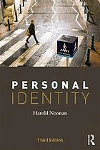 Harold W. Noonan
Harold W. Noonan
Personal Identity
(Routledge 2019, 3rd edition)
Who am I? What is a person? What does it take for a person to persist from one time to another? What is the relation between the mind and the body? Thoroughly reviewed in light of advances in the latest research, the third edition of this book is a clear and comprehensive introduction to the foregoing questions and more. Previous editions 1989, 2003. See Routledge | Amazon | Google
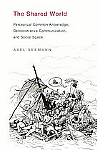 Axel Seemann
Axel Seemann
The Shared World: Perceptual Common Knowledge, Demonstrative Communication, and Social Space
(MIT 2019)
What is the role of others in the perception and cognition of our surroundings? Seemann argues that creatures capable of joint attention operate in an environment that they, through their communication with each other, help constitute. He shows how this illuminates both the social aspect of the mind as well as the larger philosophical debate about the nature of the mind. See MIT | Amazon | Google
 Cheng, Deroy & Spence (eds.)
Cheng, Deroy & Spence (eds.)
Spatial Senses: Philosophy of Perception in an Age of Science
(Routledge 2019)
This collection of essays brings together research on sense modalities in general and spatial perception in particular in a systematic and interdisciplinary way. It updates a long-standing philosophical fascination with this topic by incorporating theoretical and empirical research from cognitive science, neuroscience, and psychology. See Routledge | Amazon | Google
 Han-Kyul Kim
Han-Kyul Kim
Locke’s Ideas of Mind and Body
(Routledge 2019)
Modern commentators have generally missed the significance of Locke’s ‘mind-body nominalism.’ His nominal symmetry between mind and body is not a form of metaphysical dualism. It is a brand of naturalism that does not insist that the material is ontologically prior to the mental. A highly original interpretation of Locke’s position on the mind-body problem. See Routledge | Amazon | Google
 Annaka Harris
Annaka Harris
Conscious: A Brief Guide to the Fundamental Mystery of the Mind
(Harper Collins 2019)
What is consciousness? How does it arise? And why does it exist? In this wonderfully accessible book, Harris guides us through the evolving definitions, philosophies and scientific findings that probe our limited understanding of consciousness. A mind-expanding dive into the mystery of consciousness and an illuminating meditation on the self, free will and felt experience. See Harper Collins | Amazon | Google
 Colombo, Irvine & Stapleton (eds.)
Colombo, Irvine & Stapleton (eds.)
Andy Clark and His Critics
(Oxford 2019)
A range of high-profile researchers in philosophy of mind and cognitive science critically engage with Clark’s work across the themes of: Extended, Embodied, Embedded, Enactive and Affective Minds; Natural Born Cyborgs; and Perception, Action, and Prediction. With a foreword by Daniel Dennett and replies by Clark. See Oxford | Amazon | Google
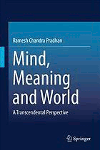 Ramesh Chandra Pradhan
Ramesh Chandra Pradhan
Mind, Meaning and World: A Transcendental Perspective
(Springer 2019)
This book approaches mind, meaning and consciousness from a non-naturalist or transcendental point of view. The problem of mind cannot be solved within the naturalist framework, which has reached a dead end. This work reverses this trend and brings back the long neglected transcendental theory of Kant and Husserl in the West and Vedanta and Buddhism in India. See Springer | Amazon | Google
 Michael D. Kirchhoff & Julian Kiverstein
Michael D. Kirchhoff & Julian Kiverstein
Extended Consciousness and Predictive Processing: A Third-Wave View
(Routledge 2019)
The authors defend the controversial view that phenomenal consciousness may be realised by processes that extend across brain, body, and the social, material, and cultural world. They show how the view can be advanced by means of the increasingly influential cognitive notion of predictive processing. A state-of-the-art tour of the thesis of extended consciousness. See Routledge | Amazon | Google
 Chimakonam, Egbai, Segun & Attoe
Chimakonam, Egbai, Segun & Attoe
New Conversations on the Problems of Identity, Consciousness and Mind
(Springer 2019)
This book involves three new theories – sense-phenomenalism, equi-phenomenalism and proto-phenomenalism – arising from a new methodological framework, ‘conversational thinking,’ developed in African philosophy. Two former students and their teacher use conversational thinking to settle differences of opinion on the nature of mind and consciousness. See Springer | Amazon | Google
 Tom Cochrane
Tom Cochrane
The Emotional Mind: A Control Theory of Affective States
(Cambridge 2019)
This book offers a new theory of emotions and related affective states. Grounded in the principle of negative feedback control, Cochrane proposes a new kind of mental content called ‘valent representation,’ upon which affective states may be modeled as increasingly sophisticated layers of regulative control, which underpin the architecture of the mind as a whole. See Cambridge | Amazon | Google
 Christian List
Christian List
Why Free Will Is Real
(Harvard 2019)
Many philosophers have suggested that we may be causally determined at the neurophysiological level, but not at the psychological. List offers a detailed proposal of how this might work, and of how it can underpin an account of free will. An incisive introduction to contemporary thinking about how we might be free in a causally-determined world. See Harvard | Amazon | Google
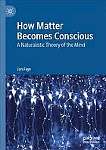 Jan Faye
Jan Faye
How Matter Becomes Conscious: A Naturalistic Theory of the Mind
(Springer 2019)
This book offers a promising alternative to the major theories of the mind-body problem. The quality of our experiences should not be associated with subjectivity that is not open for scientific explanation, nor with intrinsic properties of the brain. Instead, mental properties are extrinsic properties of the brain caused by the organism’s interaction with its environment. See Springer | Amazon | Google
 Luke Roelofs
Luke Roelofs
Combining Minds: How to Think about Composite Subjectivity
(Oxford 2019)
Roelofs examines the idea of minds built up out of other minds, asks if this is possible, and considers its implications. He surveys many areas of philosophy and psychology and concludes that composite subjectivity may be more common than we think. This is also the first book-length defence of constitutive panpsychism against all aspects of the ‘combination problem.’ See Oxford | Amazon | Google
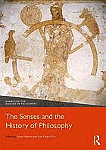 Brian Glenney & José Filipe Silva (eds.)
Brian Glenney & José Filipe Silva (eds.)
The Senses and the History of Philosophy
(Routledge 2019)
The study of perception and the role of the senses have recently risen to prominence in philosophy. However, the philosophical history of the senses remains a relatively neglected subject. Moving beyond the current canon, this volume offers a wide-ranging philosophical exploration of the senses from the classical period to the present day. See Routledge | Amazon | Google
 Stephen T. Asma & Rami Gabriel
Stephen T. Asma & Rami Gabriel
The Emotional Mind: The Affective Roots of Culture and Cognition
(Harvard 2019)
For nearly 200 million years before humans developed a capacity to reason, the emotional centers of the brain were hard at work. Drawing on data and insights from philosophy, biology, anthropology, neuroscience, and psychology, Asma and Gabriel argue that emotional systems are indeed central to understanding the evolution of the human mind. See Harvard | Amazon | Google
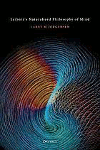 Larry M. Jorgensen
Larry M. Jorgensen
Leibniz’s Naturalized Philosophy of Mind
(Oxford 2019)
A systematic reappraisal of Leibniz’s philosophy of mind, revealing the full metaphysical background that allowed him to see farther than his contemporaries. In recent philosophy much effort has been put into discovering a naturalized theory of mind. Leibniz’s efforts to reach a similar goal offer a critical stance from which we can assess our own theories. See Oxford | Amazon | Google
 Paul Thagard
Paul Thagard
Brain-Mind: From Neurons to Consciousness and Creativity
(Oxford 2019)
The mind has been identified with a soul, computer, brain, dynamical system, or even a social construction. Thagard explains a mind in terms of interacting mechanisms operating at multiple levels, from the molecular to the social, and shows how the semantic pointer architecture of Chris Eliasmith can help explain consciousness, cognition and related concepts. See Oxford | Amazon | Google
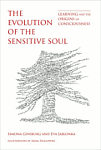 Simona Ginsburg & Eva Jablonka
Simona Ginsburg & Eva Jablonka
The Evolution of the Sensitive Soul: Learning and the Origins of Consciousness
(MIT 2019)
What marked the evolutionary transition from organisms that lacked consciousness to those with consciousness – to minimal subjective experiencing, or, as Aristotle described it, “the sensitive soul”? In this book, Ginsburg and Jablonka propose a new theory about the origin of consciousness that finds learning to be the driving force in the transition to basic consciousness. See MIT | Amazon | Google
 Anil Gupta
Anil Gupta
Conscious Experience: A Logical Inquiry
(Harvard 2019)
Gupta presents a novel account of the relation between conscious experience and logical reasoning. According to Gupta, the role of experience in cognition is not to provide us with concepts, knowledge, or entitlement to judgments. Its role is rather to authorize transitions from prior views to new views, including transitions from views to judgments. See Harvard | Amazon | Google
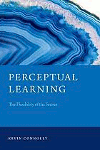 Kevin Connolly
Kevin Connolly
Perceptual Learning: The Flexibility of the Senses
(Oxford 2019)
Experts from wine-tasters to radiologists to bird-watchers have all undergone perceptual learning: long-term changes in perception that result from practice or experience. Philosophers have noticed and discussed such cases for centuries. This book offers a comprehensive empirically-informed account of the phenomenon and explores its nature, scope and theoretical implications. See Oxford | Amazon | Google
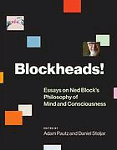 Adam Pautz & Daniel Stoljar (eds.)
Adam Pautz & Daniel Stoljar (eds.)
Blockheads!: Essays on Ned Block’s Philosophy of Mind and Consciousness
(MIT 2019)
Perhaps more than any other philosopher of mind, Ned Block synthesizes philosophical and scientific approaches to the mind; he is unique in moving back and forth across this divide, doing so with creativity and intensity. This volume offers eighteen new essays on Block’s work along with substantive and wide-ranging replies by Block. See MIT | Amazon | Google
 Alan Millar
Alan Millar
Knowing by Perceiving
(Oxford 2019)
Epistemological discussions of perception usually sidestep the notion of knowledge and ask how perceptual beliefs can be justified in terms of “sensory experiences.” In contrast, Millar argues that perceptual justification should be grounded in perceptual knowledge, which should in turn be explained in terms of recognitional abilities. See Oxford | Amazon | Google
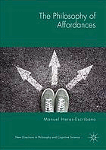 Manuel Heras-Escribano
Manuel Heras-Escribano
The Philosophy of Affordances
(Palgrave Macmillan 2019)
The concept of affordance, coined and developed in the field of ecological psychology, describes the possibilities for action available in the environment. This work spells out the key philosophical features of affordances and analyzes the implications that a proper understanding of affordances has for the philosophy of mind and the cognitive sciences. See Palgrave | Amazon | Google
 Douglas S. Duckworth
Douglas S. Duckworth
Tibetan Buddhist Philosophy of Mind and Nature
(Oxford 2019)
This thematic study engages some of the most critical topics in Buddhist thought, such as the nature of mind and the meaning of emptiness, across a wide range of traditions, including the “Middle Way” of Madhyamaka, Yogacara (“Mind-Only”), and tantra. Duckworth provides a richly textured overview of the nature of mind, language, and world in Tibetan Buddhist traditions. See Oxford | Amazon | Google
 Kevin Morris
Kevin Morris
Physicalism Deconstructed: Levels of Reality and the Mind–Body Problem
(Cambridge 2019)
Contemporary forms of physicalism are typically non-reductive, levels-based positions, on which the physical domain is fundamental, while thought and consciousness are higher-level processes, dependent somehow on physical processes. Morris shows that it is hard to make sense of this idea and recommends instead a form of one-level, reductive physicalism. See Cambridge | Amazon | Google

Wundt, Avenarius, and Scientific Psychology: A Debate at the Turn of the Twentieth Century
(Palgrave Macmillan 2019)
This book reconstructs the rise and fall of Wilhelm Wundt’s fortunes, focusing for the first time on the role of Richard Avenarius as catalyst for the so-called “positivist repudiation of Wundt.” Krauss specifically looks at the progressive disavowal of Wundtian ideas in the world of scientific psychology, and especially by his former pupils. See Springer | Amazon | Google | New Books Network

Embodied Cognition
(Routledge 2019, 2nd edition)
Sets out the central themes and debates surrounding embodied cognition, explaining and assessing the work of key figures in the field such as Barsalou, Casasanto, Clark, Noë and Spivey. Substantially revised and more user-friendly than the original 2010 edition, this is the most up-to-date book length treatment of the field presently available. See Routledge | Amazon | Google

Physiology of the Soul: Mind, Body and Matter in the Galenic Tradition of Late Renaissance (1550-1630)
(Brepols 2019)
Despite the common opinion that Galen’s authority was superseded by Vesalius and his followers, a close look at his influence on the early moderns reveals a different picture. Galenists embraced the new anatomical discoveries and transformed the traditional rationale. Through the lens of mental disease, a new concept of the human animal emerges, foreshadowing early modern ideas on subjectivity and the self. See Brepols | Google

Are We Bodies or Souls?
(Oxford 2019)
Swinburne defends the soul with new philosophical arguments supported by neuroscience. Sensations, thoughts, and intentions are conscious events in our souls that cause events in our brains. While scientists might discover laws that link conscious events and brain events, each person’s soul is an individual thing and this is what ultimately makes us who we are. See Oxford | Amazon | Google

Acquaintance: New Essays
(Oxford 2019)
Russell famously distinguished between ‘knowledge by acquaintance’ and ‘knowledge by description.’ For much of the latter half of the twentieth century, the notion of acquaintance was viewed with suspicion, but in the past decade or two the concept has undergone a striking revival. As this volume testifies, acquaintance is, it seems, respectable again. See Oxford | Amazon | Google

The Idea of the World: A Multi-Disciplinary Argument for the Mental Nature of Reality
(John Hunt 2019)
This book compiles an overarching case for idealism, the notion that reality is essentially mental, from ten original articles the author has previously published. Kastrup explains his dissatisfaction with mainstream physicalism and advances a compelling formulation of idealism that elegantly makes sense of and reconciles classical and quantum worlds. See John Hunt | Amazon | Google

10 Voyages Through the Human Mind: Christmas Lectures from the Royal Institution
(Michael O’Mara 2019)
Undoubtedly the most complex material in the universe, the human brain makes us who we are, but how it works has long been a mystery. Through this series of Christmas Lectures from the Royal Institution, spanning over a hundred years, experts in the fields of psychology, neurology and biology examine our most important organ, revealing a hidden and complex world. See Michael O’Mara | Amazon | Google

The Feeling of Life Itself: Why Consciousness is Widespread but Can’t Be Computed
(MIT 2019)
To grasp how the brain can give rise to subjective experience, we need a quantitative theory that starts with experience and proceeds to the brain. In this book, Koch outlines such a theory, based on integrated information, and ponders its implications. Programmable computers will not have consciousness because consciousness is not a special type of computation but the feeling of being alive. See MIT | Amazon | Google

Mental Causation: A Counterfactual Theory
(Cambridge 2019)
Our minds have physical effects. This happens, for instance, when we move our bodies when we act. How is this possible? Kroedel defends an account of mental causation in terms of difference-making: if our minds had been different, the physical world would have been different; therefore, the mind causes events in the physical world. See Cambridge | Amazon | Google

Am I Just My Brain?
(The Good Book Company 2019)
What is the relation between our brains and our minds? Are we more than machines? Is free-will an illusion? Do we have a soul? Brain-imaging scientist Sharon Dirckx lays out the current understanding of who we are from biologists, philosophers, theologians and psychologists, and suggests answers to the fundamental questions of our existence. See Good Book Company | Amazon | Google

A Multisensory Philosophy of Perception
(Oxford 2019)
Most of the time, we perceive using multiple senses and use our senses together to navigate the world. In spite of this, scientists and philosophers alike have focused merely on one sense at a time. Nearly every theory of perception is unisensory. In this book, O’Callaghan offers instead a revisionist multisensory philosophy of perception. See Oxford | Amazon | Google

Automata’s Inner Movie: Science and Philosophy of Mind
(Vernon Press 2019)
The philosophy of mind often intersects with biology and neuroscience. This volume draws together thinkers from both fields and allows readers to understand the general field of theoretical neurophilosophy. Science’s dependence on theoretical frameworks mirrors philosophy’s dependence on empirical data – this volume unites the two missions. See Vernon Press | Amazon | Google

Human and Animal Minds: The Consciousness Questions Laid to Rest
(Oxford 2019)
The continuities between human and animal minds are increasingly well understood. This has led many to make claims about consciousness in animals, which has often been taken to be crucial for their moral standing. Carruthers argues that there is no fact of the matter to be discovered and that the question of animal consciousness is of no scientific or ethical significance. See Oxford | Amazon | Google

Conscious Action Theory: An Introduction to the Event-Oriented World View
(Routledge 2019)
The assumption of “objective reality” is a cornerstone of Western thought. Baer aims to replace it with one that allows the feelings and desires of perceived objects to be included in a physical framework. Recognizing that the observer’s existence underlies all scientific inquiry, he develops an event-oriented physical theory in which the first-person observer is central. See Routledge | Amazon | Google

The Routledge Handbook of Panpsychism
(Routledge 2019)
This volume of twenty-eight original essays from leading researchers is a comprehensive examination and assessment of panpsychism: the view that consciousness is a fundamental and ubiquitous feature of the world, though in a form remote from human consciousness. Covers the subject, its history and its contemporary development. See Routledge | Amazon | Google

Structuring the Self
(Palgrave Macmillan 2019)
The substantivalist theory of the self holds that the self is an individual object that bears properties and preserves its identity over time. Neither philosophical argument nor science appears to support this view. Beni offers instead a structural realist account of the self informed by recent work in empirical psychology and computational neuroscience. See Palgrave | Amazon | Google

Knowing Other Minds
(Oxford 2019)
We take it for granted that we can often know the thoughts and feelings of others. But how is this kind of knowledge possible? This volume brings together ten original essays on questions that arise from our everyday social interaction with others and illustrates how questions in philosophy and empirical cognitive science overlap and inform one another. See Oxford | Amazon | Google

Galileo’s Error: Foundations for a New Science of Consciousness
(Penguin Random House 2019)
Based on the work of Arthur Eddington and Bertrand Russell in the 1920s, as well as on an analysis of the philosophical underpinnings of modern science, Goff makes the case for panpsychism, a theory which posits that consciousness is not confined to biological entities but is a fundamental feature of all physical matter—from subatomic particles to the human brain. See Penguin Random House | Amazon | Google

Sensations, Thoughts, Language: Essays in Honor of Brian Loar
(Routledge 2019)
Brian Loar (1939-2014) was an eminent and highly-respected philosopher of mind and language. This volume honors the entirety of his philosophical career, covering his work in the philosophy of language, the philosophy of mind, and consciousness. A fitting tribute to and a timely reflection on Loar’s enduring influence on the philosophy of mind and language. See Routledge | Amazon | Google

The Illusions of Time: Philosophical and Psychological Essays on Timing and Time Perception
(Palgrave Macmillan 2019)
This anthology gathers eighteen original papers from current leading researchers in the philosophy and cognitive science of temporal illusions Four broad topics are covered: illusions of temporal passage, illusions and duration, illusions of temporal order and simultaneity, and the relationship between temporal illusions and the cognitive representation of time. See Palgrave Macmillan | Amazon | Google

Memory: A Self-Referential Account
(Oxford 2019)
The goal of this book is to understand a capacity which is central to our mental lives: the capacity for remembering. It offers a unified account of four aspects of memory: its metaphysical nature, its intentional features, its epistemic nature, and its phenomenal features. Fernández suggests that a good account of the first two features will shed light on the latter two. See Oxford | Amazon | Google

Understanding Animals: Philosophy for Dog and Cat Lovers
(Reaktion Books 2019)
How do animals perceive the world? What is it like to be a cat or a dog? Svendsen investigates how we can begin to understand the lives of other animals from chimpanzees to the octopus, though his main focus is on cats and dogs. He considers animal communication, intelligence, self-awareness, loneliness, grief, and how humans and animals can cohabit successfully. See Reaktion Books | Amazon | Google

Artificial You: AI and the Future of Your Mind
(Princeton 2019)
A sober-minded philosophical exploration of what AI can and cannot achieve. Can robots be conscious? Can human beings merge with AI? Is the mind just a program? Schneider proposes ways to test for machine consciousness, asks if consciousness is an unavoidable byproduct of sophisticated intelligence, and considers the overall dangers of creating machine minds. See Princeton | Amazon | Google

Moral Foundations of Philosophy of Mind
(Springer 2019)
Drawing from a variety of traditions including Wittgenstein, Lacan, analytic philosophy, and phenomenology, these essays explore how unacknowledged moral concerns are integral to debates in the philosophy of mind. We can make sense of the dynamics and significance of these debates only when we understand the moral forces that shape them. See Springer | Amazon | Google

Mind, Body, and Morality: New Perspectives on Descartes and Spinoza
(Routledge 2019)
Descartes has recently been reinterpreted in important ways, specifically concerning his work on mind and body, objective and formal reality, and morality. This has coincided with a renewed interest in overlooked parts of the Cartesian corpus and the similarities between Descartes and Spinoza. The essays in this volume examine this new turn in Descartes and Spinoza scholarship. See Routledge | Amazon | Google

Rethinking Consciousness: A Scientific Theory of Subjective Experience
(W. W. Norton 2019)
Scholars have traditionally assumed that something as amorphous and slippery as consciousness must be impossible to understand scientifically. In this book, written for the general reader, Graziano spells out a promising scientific theory of consciousness—the attention-schema theory—that can apply equally to biological brains and artificial machines. See W. W. Norton | Amazon | Google

The Knowledge Argument
(Cambridge 2019)
Frank Jackson’s knowledge argument revolves around a scientist, Mary, forced to study human colour vision using only black and white resources. The argument was designed to show that the ‘physicalist’ picture of the mind is incomplete. This volume examines this powerful and controversial argument and its relevance for philosophy of mind today. See Cambridge | Amazon | Google

The Deep History of Ourselves: The Four-Billion-Year Story of How We Got Conscious Brains
(Penguin Random House 2019)
Renowned neuroscientist Joseph LeDoux digs into the natural history of life on earth to provide a new perspective on the similarities between us and our ancestors in deep time. This page-turning survey of the whole of terrestrial evolution sheds new light on how nervous systems evolved in animals, how the brain developed, and what it means to be human. See Penguin Random House | Amazon | Google

The Case Against Reality: Why Evolution Hid the Truth from Our Eyes
(W. W. Norton 2019)
Do we perceive the world as it truly is? Cognitive scientist Donald Hoffman says no: while we should take our perceptions seriously, we should not take them literally. How can it be that the world we see is not objective reality? And how can our senses be useful if they do not tell the truth? Hoffman grapples with these questions and more in this eye-opening work. See W. W. Norton | Amazon | Google

Am I Dreaming?: The New Science of Consciousness and How Altered States Reboot the Brain
(Atlantic Books 2019)
When a computer goes wrong, we turn it off and on again. Kingsland reveals how the human brain is similar. By ‘rebooting’ our patterns of thinking, we can gain new perspectives into the world around us. From shamans in Peru to tech workers in Silicon Valley, this is a fascinating tour through lucid dreams, mindfulness, hypnotic trances, virtual reality and drug-induced hallucinations. See Atlantic Books | Amazon | Google

The Epistemic Role of Consciousness
(Oxford 2019)
What is the role of consciousness in our mental lives? Smithies argues that consciousness is essential to explaining how we can acquire knowledge and justified belief about the world. On this view, unconscious beings cannot form justified beliefs and so cannot know anything at all. Consciousness is the ultimate basis of all knowledge and epistemic justification. See Oxford | Amazon | Google

Personal Identity
(Routledge 2019, 3rd edition)
Who am I? What is a person? What does it take for a person to persist from one time to another? What is the relation between the mind and the body? Thoroughly reviewed in light of advances in the latest research, the third edition of this book is a clear and comprehensive introduction to the foregoing questions and more. Previous editions 1989, 2003. See Routledge | Amazon | Google

The Shared World: Perceptual Common Knowledge, Demonstrative Communication, and Social Space
(MIT 2019)
What is the role of others in the perception and cognition of our surroundings? Seemann argues that creatures capable of joint attention operate in an environment that they, through their communication with each other, help constitute. He shows how this illuminates both the social aspect of the mind as well as the larger philosophical debate about the nature of the mind. See MIT | Amazon | Google

Spatial Senses: Philosophy of Perception in an Age of Science
(Routledge 2019)
This collection of essays brings together research on sense modalities in general and spatial perception in particular in a systematic and interdisciplinary way. It updates a long-standing philosophical fascination with this topic by incorporating theoretical and empirical research from cognitive science, neuroscience, and psychology. See Routledge | Amazon | Google

Locke’s Ideas of Mind and Body
(Routledge 2019)
Modern commentators have generally missed the significance of Locke’s ‘mind-body nominalism.’ His nominal symmetry between mind and body is not a form of metaphysical dualism. It is a brand of naturalism that does not insist that the material is ontologically prior to the mental. A highly original interpretation of Locke’s position on the mind-body problem. See Routledge | Amazon | Google

Conscious: A Brief Guide to the Fundamental Mystery of the Mind
(Harper Collins 2019)
What is consciousness? How does it arise? And why does it exist? In this wonderfully accessible book, Harris guides us through the evolving definitions, philosophies and scientific findings that probe our limited understanding of consciousness. A mind-expanding dive into the mystery of consciousness and an illuminating meditation on the self, free will and felt experience. See Harper Collins | Amazon | Google

Andy Clark and His Critics
(Oxford 2019)
A range of high-profile researchers in philosophy of mind and cognitive science critically engage with Clark’s work across the themes of: Extended, Embodied, Embedded, Enactive and Affective Minds; Natural Born Cyborgs; and Perception, Action, and Prediction. With a foreword by Daniel Dennett and replies by Clark. See Oxford | Amazon | Google

Mind, Meaning and World: A Transcendental Perspective
(Springer 2019)
This book approaches mind, meaning and consciousness from a non-naturalist or transcendental point of view. The problem of mind cannot be solved within the naturalist framework, which has reached a dead end. This work reverses this trend and brings back the long neglected transcendental theory of Kant and Husserl in the West and Vedanta and Buddhism in India. See Springer | Amazon | Google

Extended Consciousness and Predictive Processing: A Third-Wave View
(Routledge 2019)
The authors defend the controversial view that phenomenal consciousness may be realised by processes that extend across brain, body, and the social, material, and cultural world. They show how the view can be advanced by means of the increasingly influential cognitive notion of predictive processing. A state-of-the-art tour of the thesis of extended consciousness. See Routledge | Amazon | Google

New Conversations on the Problems of Identity, Consciousness and Mind
(Springer 2019)
This book involves three new theories – sense-phenomenalism, equi-phenomenalism and proto-phenomenalism – arising from a new methodological framework, ‘conversational thinking,’ developed in African philosophy. Two former students and their teacher use conversational thinking to settle differences of opinion on the nature of mind and consciousness. See Springer | Amazon | Google

The Emotional Mind: A Control Theory of Affective States
(Cambridge 2019)
This book offers a new theory of emotions and related affective states. Grounded in the principle of negative feedback control, Cochrane proposes a new kind of mental content called ‘valent representation,’ upon which affective states may be modeled as increasingly sophisticated layers of regulative control, which underpin the architecture of the mind as a whole. See Cambridge | Amazon | Google

Why Free Will Is Real
(Harvard 2019)
Many philosophers have suggested that we may be causally determined at the neurophysiological level, but not at the psychological. List offers a detailed proposal of how this might work, and of how it can underpin an account of free will. An incisive introduction to contemporary thinking about how we might be free in a causally-determined world. See Harvard | Amazon | Google

How Matter Becomes Conscious: A Naturalistic Theory of the Mind
(Springer 2019)
This book offers a promising alternative to the major theories of the mind-body problem. The quality of our experiences should not be associated with subjectivity that is not open for scientific explanation, nor with intrinsic properties of the brain. Instead, mental properties are extrinsic properties of the brain caused by the organism’s interaction with its environment. See Springer | Amazon | Google

Combining Minds: How to Think about Composite Subjectivity
(Oxford 2019)
Roelofs examines the idea of minds built up out of other minds, asks if this is possible, and considers its implications. He surveys many areas of philosophy and psychology and concludes that composite subjectivity may be more common than we think. This is also the first book-length defence of constitutive panpsychism against all aspects of the ‘combination problem.’ See Oxford | Amazon | Google

The Senses and the History of Philosophy
(Routledge 2019)
The study of perception and the role of the senses have recently risen to prominence in philosophy. However, the philosophical history of the senses remains a relatively neglected subject. Moving beyond the current canon, this volume offers a wide-ranging philosophical exploration of the senses from the classical period to the present day. See Routledge | Amazon | Google

The Emotional Mind: The Affective Roots of Culture and Cognition
(Harvard 2019)
For nearly 200 million years before humans developed a capacity to reason, the emotional centers of the brain were hard at work. Drawing on data and insights from philosophy, biology, anthropology, neuroscience, and psychology, Asma and Gabriel argue that emotional systems are indeed central to understanding the evolution of the human mind. See Harvard | Amazon | Google

Leibniz’s Naturalized Philosophy of Mind
(Oxford 2019)
A systematic reappraisal of Leibniz’s philosophy of mind, revealing the full metaphysical background that allowed him to see farther than his contemporaries. In recent philosophy much effort has been put into discovering a naturalized theory of mind. Leibniz’s efforts to reach a similar goal offer a critical stance from which we can assess our own theories. See Oxford | Amazon | Google

Brain-Mind: From Neurons to Consciousness and Creativity
(Oxford 2019)
The mind has been identified with a soul, computer, brain, dynamical system, or even a social construction. Thagard explains a mind in terms of interacting mechanisms operating at multiple levels, from the molecular to the social, and shows how the semantic pointer architecture of Chris Eliasmith can help explain consciousness, cognition and related concepts. See Oxford | Amazon | Google

The Evolution of the Sensitive Soul: Learning and the Origins of Consciousness
(MIT 2019)
What marked the evolutionary transition from organisms that lacked consciousness to those with consciousness – to minimal subjective experiencing, or, as Aristotle described it, “the sensitive soul”? In this book, Ginsburg and Jablonka propose a new theory about the origin of consciousness that finds learning to be the driving force in the transition to basic consciousness. See MIT | Amazon | Google

Conscious Experience: A Logical Inquiry
(Harvard 2019)
Gupta presents a novel account of the relation between conscious experience and logical reasoning. According to Gupta, the role of experience in cognition is not to provide us with concepts, knowledge, or entitlement to judgments. Its role is rather to authorize transitions from prior views to new views, including transitions from views to judgments. See Harvard | Amazon | Google

Perceptual Learning: The Flexibility of the Senses
(Oxford 2019)
Experts from wine-tasters to radiologists to bird-watchers have all undergone perceptual learning: long-term changes in perception that result from practice or experience. Philosophers have noticed and discussed such cases for centuries. This book offers a comprehensive empirically-informed account of the phenomenon and explores its nature, scope and theoretical implications. See Oxford | Amazon | Google

Blockheads!: Essays on Ned Block’s Philosophy of Mind and Consciousness
(MIT 2019)
Perhaps more than any other philosopher of mind, Ned Block synthesizes philosophical and scientific approaches to the mind; he is unique in moving back and forth across this divide, doing so with creativity and intensity. This volume offers eighteen new essays on Block’s work along with substantive and wide-ranging replies by Block. See MIT | Amazon | Google

Knowing by Perceiving
(Oxford 2019)
Epistemological discussions of perception usually sidestep the notion of knowledge and ask how perceptual beliefs can be justified in terms of “sensory experiences.” In contrast, Millar argues that perceptual justification should be grounded in perceptual knowledge, which should in turn be explained in terms of recognitional abilities. See Oxford | Amazon | Google

The Philosophy of Affordances
(Palgrave Macmillan 2019)
The concept of affordance, coined and developed in the field of ecological psychology, describes the possibilities for action available in the environment. This work spells out the key philosophical features of affordances and analyzes the implications that a proper understanding of affordances has for the philosophy of mind and the cognitive sciences. See Palgrave | Amazon | Google

Tibetan Buddhist Philosophy of Mind and Nature
(Oxford 2019)
This thematic study engages some of the most critical topics in Buddhist thought, such as the nature of mind and the meaning of emptiness, across a wide range of traditions, including the “Middle Way” of Madhyamaka, Yogacara (“Mind-Only”), and tantra. Duckworth provides a richly textured overview of the nature of mind, language, and world in Tibetan Buddhist traditions. See Oxford | Amazon | Google

Physicalism Deconstructed: Levels of Reality and the Mind–Body Problem
(Cambridge 2019)
Contemporary forms of physicalism are typically non-reductive, levels-based positions, on which the physical domain is fundamental, while thought and consciousness are higher-level processes, dependent somehow on physical processes. Morris shows that it is hard to make sense of this idea and recommends instead a form of one-level, reductive physicalism. See Cambridge | Amazon | Google
Menu
 What’s a logical paradox?
What’s a logical paradox? Achilles & the tortoise
Achilles & the tortoise The surprise exam
The surprise exam Newcomb’s problem
Newcomb’s problem Newcomb’s problem (sassy version)
Newcomb’s problem (sassy version) Seeing and being
Seeing and being Logic test!
Logic test! Philosophers say the strangest things
Philosophers say the strangest things Favourite puzzles
Favourite puzzles Books on consciousness
Books on consciousness Philosophy videos
Philosophy videos Phinteresting
Phinteresting Philosopher biographies
Philosopher biographies Philosopher birthdays
Philosopher birthdays Draft
Draftbarang 2009-2025  wayback machine
wayback machine
 wayback machine
wayback machine